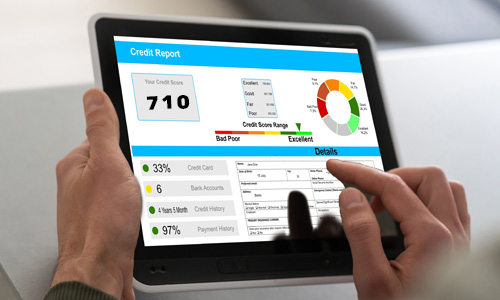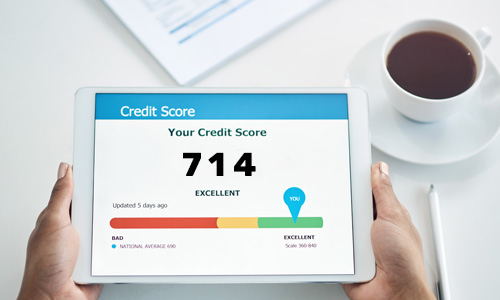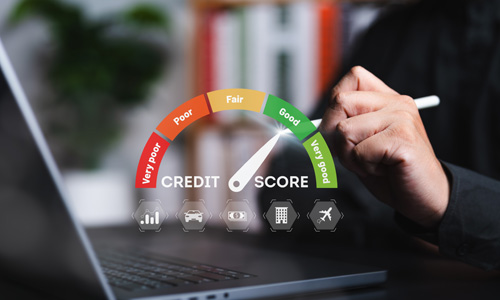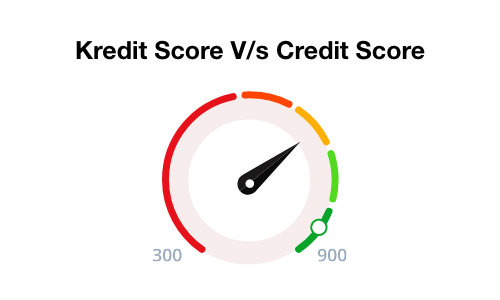How to Improve/Increase Credit Score in UAE
What is a Credit Score?
A credit score is a three-digit value assigned to individuals based on their financial activities like their debt repayment schedule, number of active loans, on-time or delayed bill payments, and much more. While it may appear a simple figure, credit score plays a critical role when it comes to taking any kind of loan in the UAE. More than just helping you get a loan or a credit card, a good credit score can also help you receive these services at reasonable interest rates and a higher credit limit. Building a good credit score is not easy as it takes continuous effort in managing finances, paying debts and monthly payments at the same time, etc. At the same time, it’s not that difficult, as a few essential steps can help you maintain a satisfactory score to avoid any hassles in obtaining major financial services. In this article, we will help you know about some effective tips that you can utilise to improve your credit score quickly.
How to Improve/Increase Credit Score in UAE?
If you are planning to apply for a credit card in the UAE, you must first check your credit score. And don’t worry even if it does not look good, as here are a few fastest ways to improve credit score!
- Making Some Extra Deposits
- Paying Bills on Time
- Getting a New Credit Card
- Clearing Existing Dues
- Checking Your Credit Report
- Managing Existing Credit Cards Effectively
- Multiple Loan Applications
Making Some Extra Deposits
Making extra deposits in your bank account or credit card account can also help you enhance your credit score. You can simply pay an amount more than the outstanding amount at the end of your billing cycle to add some extra funds to your credit card.
Paying Bills on Time
As mentioned earlier, delayed or partial credit card bill payments negatively hit your credit score. Thus, you can start by making sure that you pay all your bills on time and improve your credit score. However, it should be noted that this practise extends beyond credit card bills, as you must do the same with all the other ongoing monthly payments like personal loans, auto loans, home loans instalments, etc.
Getting a New Credit Card
Not having an active credit card doesn’t mean that you have a high credit score, as your credit score is also impacted by loan repayment activities. So even if you don’t have a credit card but make delayed loan repayments, your credit score will diminish. In such cases, getting a new credit card and maintaining punctuality regarding its payments is an excellent way to increase your credit score with great ease.
Clearing Existing Dues
Paying off your existing dues and making all the repayments on or before the due date is one of the best ways to improve your credit score. You can use various available options like balance transfers, personal loans, cash in advance, etc., to pay off your existing debts and easily boost your credit score.
Checking Your Credit Report
Make sure you check your credit report frequently to check if it has been created rightly and has the details regarding your credit score correct. This helps you rectify any errors and make sure that everything is mentioned correctly in the report.
Managing Existing Credit Cards Effectively
If you have existing credit cards, make sure that you manage them appropriately in terms of usage and payments. Ensure that you use them all and not leave any of the credit card accounts dormant. Contrary to popular opinion, leaving a credit card unused and abruptly closing or deactivating it has a negative impact on your credit score. Consequently, you should try and make some payments using each of your credit cards to avoid taking a hit on your credit score.
Multiple Loan Applications
Getting your loan or a credit card application rejected can also affect your credit score. Thus, experts recommend that one should not apply for multiple loans and credit cards at the same time. In case you get your credit card application rejected, you can try to check if you have provided the right set of documents, possess a good debt burden ratio, and have a healthy credit score. As getting an application rejected curtails your credit score, ensure that you check all the stated aspects before applying for a credit card.
Why is Credit Score Important in UAE?
Banks and other financial institutions in the UAE first verify your credit score before providing you with a loan or a credit card. Your credit score helps them evaluate your financial stability and how you manage your finances. A good credit score can help you get quick loan and credit card approval with preferential rates and benefits without any hassle.
However, keep in mind that credit score is not the only factor that the banks consider. Your age, location, monthly income, number of active loans, etc., are some other factors that contribute to your risk profiling.
How Credit Scores in the UAE Work
A top financial authority, named Al Etihad Credit Bureau (AECB), analyses your credit score and financial data in the UAE. The data recorded by them comprise your payment history of all the monthly instalments, credit card bills, utility bills, telecommunication bills, and more.
The authority creates credit reports and makes them available to all the financial institutions, money lending bodies, organisations, and individuals. This helps the decisions of the providers of the banking products regarding the approval and extent of credit on credit solutions like mortgages, car loans, credit cards, etc.
To sum it up, lending institutions analyse your credit report with all the other factors and check if you can manage to pay for more debts while fulfilling your other financial requirements. The approval or rejection of your application depends upon that. So if you want your application to get approved without hassles, make sure you improve your credit score and maintain it like that today.
What Affects the Credit Score in UAE?
Here are a few major factors that can affect your credit score in UAE.
Irregular Debt Payments
Paying your debts and monthly loan payments on or before the due date can have a positive impact on your credit score. Make sure you have zero irregular payments so that your credit score remains intact.
Number of Credit Cards
The number of active credit cards and loans also contributes to your credit score. Having too many credit cards can affect your credit card application in a negative way, as the probability of improper management increases with the number of cards especially if most of them are obtained unnecessarily.
Too Many Bank Accounts
Opening many bank accounts and not meeting their monthly average balance requirements can also affect your credit score negatively.
Number of Credit Inquiries
Calling a bank’s help and support line multiple times just to enquire about your credit options also negatively impacts your credit score. You can visit the bank’s website to find answers to your queries.
Missed Credit Card Payments
Making delayed (or missing) credit card payments shows that you don’t have the capacity to manage your financial requirements. An excellent way to counter this issue is to activate standing instructions. With standing instructions activated in your bank account, your monthly payments get deducted automatically, and you need not remember to pay them every month.
Credit Utilisation
Utilising more than your approved credit limit can take another hit at your credit score. You can keep track of your credit card usage by logging in to the concerned bank’s online or mobile banking portal. Moreover, you can activate the SMS notifications service to get text messages of all your transactions and keep a check on your usage.
Debt-to-Income Ratio
Having a poor debt-to-income ratio can have a negative influence on your credit score. It is recommended to make sure that you don’t take credit for more than the amount you have coming in every month.
Applying for a Loan Repeatedly
Applying for a credit card or a loan multiple times, and getting rejected each time, can also affect your credit history and bring down your credit score.
| Check your AECB Credit Score |
Key Takeaways
- Pay all your dues on time and maintain a good credit score.
- Ensure checking your credit report at least once every month to keep track of the same.
- Make sure you meet the eligibility criteria of the credit card or a loan you are applying for to avoid any rejection of the application.
- You can check your credit score with us in no time.
- Visit our credit cards section or contact our help and support line in case of any questions.
| Credit Score for different types of Loan | ||
|---|---|---|
| Credit Score for Personal Loan | Credit Score for House Loan | Credit score for Student Loan |

More From Credit Score
- Recent Articles
- Popular Articles












